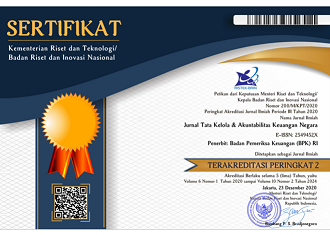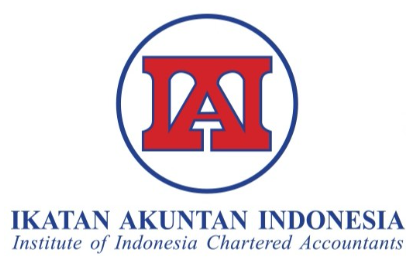Maturity of Internal Control System, the Capability of Internal Auditors, and Performance Accountability in Local Governments
DOI:
https://doi.org/10.28986/jtaken.v8i2.830Keywords:
internal audit capability, internal control, maturity, performance accountabilityAbstract
While research on the accountability of local government performance has grown significantly, little attention has been paid to the critical success factors, particularly the role of the maturity of the government's internal control system and the capability of the government's internal auditors. This study examines the effect of the maturity of the government's internal control system and the capability of the government's internal auditors on the accountability of local government performance, with control variables, namely audit opinion, local own-source revenues, and proliferation status. It aims to fill the gap using the Indonesian case. This study uses secondary data with sample selection using the purposive sampling method. Local governments in Indonesia from 2017 to 2019 are used as samples. The results of this study indicate that the government's internal control system's maturity, internal auditors' capability, and audit opinions positively affect local governments' performance accountability. In contrast, local own-source revenues and proliferation status negatively impact local governments' performance accountability. The implication of this study is to increase the accountability of local government's performance and continue to improve the maturity of the government's internal control system to achieve at least level 3 (Integrated). The capability of internal government auditors needs to achieve at least level 3 (Defined); thereby, the internal control function of local governments can be optimal.
References
Afriyanti, D., Sabanu, H. G., & Noor, F. (2018). Penilaian indeks akuntabilitas instansi pemerintah. Jurnal Tata Kelola dan Akuntabilitas Keuangan Negara, 1(1), 21–42. DOI: 10.28986/jtaken.v1i1.10
Aikins, S. K. (2011). An examination of government internal audits’ role in improving financial performance. Public Finance and Management, 11(4), 306-337.
Aikins, S. K. (2015). Performance management in government internal audits: Critical success factors. Journal of Public Administration and Governance, 5(3), 46. DOI: 10.5296/jpag.v5i3.8054
Al-Sartawi, A. M. (2018). Corporate governance and intellectual capital: Evidence from Gulf cooperation council. Academy of Accounting & Financial Studies, 22(1), 1–12.
Andersen, E. S., & Jessen, S. A. (2003). Project maturity in organizations. International Journal of Project Management, 21(6), 457–461. DOI: 10.1016/S0263-7863(02)00088-1
Armaja, A., Ibrahim, R., & Aliamin, A. (2017). Pengaruh kekayaan daerah, dana perimbangan dan belanja daerah terhadap kinerja keuangan (Studi pada Kabupaten/Kota di Aceh). Jurnal Perspektif Ekonomi Darussalam Ekonomi Darussalam, 3(2), 168–181. DOI: 10.24815/jped.v3i2.8229
BPK RI. (n.d.). Laporan Keuangan Pemerintah Daerah 2017-2019. Retrieved from https://e-ppid.bpk.go.id/
BPKP. (2015a). BPKP Regulation Number 16 of 2015 concerning Technical Guidelines for Increasing the Capability of Government Internal Supervisory Apparatus (Peraturan Kepala BPKP Nomor 16 Tahun 2015 tentang Pedoman Teknis Peningkatan Kapabilitas Aparat Pengawasan Intern Pemerintah). Retrieved from http://www.bpkp.go.id/uu/filedownload/8/132/3291.bpkp
BPKP. (2015b). Pedoman teknis penilaian mandiri kapabilitas APIP. Jakarta: BPKP.
BPKP. (2016). BPKP Regulation number 4 of 2016 concerning Guidelines for Assessment and Strategy for Improving the Maturity of the Government's Internal Control System (Peraturan Kepala BPKP Nomor 4 Tahun 2016 tentang Pedoman Penilaian dan Strategi Peningkatan Maturitas Sistem Pengendalian Intern Pemerintah). Retrieved from https://www.bpkp.go.id/uu/filedownload/8/129/3269.bpkp
BPKP. (2019). Laporan Kinerja 2018. Retrieved from https://www.bpkp.go.id/konten/3863/Laporan-Kinerja-BPKP.bpkp
BPKP. (2021). BPKP Regulation Number 5 of 2021 concerning Maturity Assessment of Implementation of the Integrated Government Internal Control System at Ministries/Agencies/Local Governments (Peraturan Badan Pengawasan Keuangan dan Pembangunan Republik Indonesia Nomor 5 Tahun 2021 tentang Penilaian Maturitas Penyelenggaraan Sistem Pengendalian Intern Pemerintah Terintegrasi pada Kementerian/Lembaga/Pemerintah Daerah). Retrieved from https://www.bpkp.go.id/uu/filedownload/8/169/4438.bpkp
BPS. (n.d.). Jumlah Kabupaten. Retrieved from https://www.bps.go.id/indicator/ 101/154/1/jumlah-kabupaten.html
Burhani, A. F. (2018). Pengaruh karakteristik pemerintah daerah terhadap akuntabilitas kinerja dengan kapabilitas APIP dan kualitas laporan keuangan sebagai variabel kontrol. (Unpublished thesis). Universitas Sebelas Maret, Surakarta, Indonesia.
Chen, V. Z., Li, J., & Shapiro, D. M. (2011). Are OECD-prescribed ‘good corporate governance practices’ really good in an emerging economy? Asia Pacific Journal of Management, 28(1), 115–138.
Cheng, R. H., Engstrom, J. H., & Kattelus, S. C. (2002). Educating government Financial Managers: University collaboration between business and public administration. The Journal of Government Financial Management, 51(3), 10.
Fryer, K., Antony, J., & Ogden, S. (2009). Performance management in the public sector. International Journal of Public Sector Management, 22(6), 478–498. DOI: 10.1108/09513550910982850
Goddard, A. (2005). Reform as regulation – accounting, governance and accountability in UK local government. Journal of Accounting & Organizational Change, 1(1), 27–44. DOI: 10.1108/18325910510 635272
Gumelar, A., Supriatna, I., & Kusumastuti, E. D. (2021). Pengaruh maturitas sistem pengendalian intern pemerintah terhadap kinerja instansi pemerintah (Studi kasus pada Pemerintah Kabupaten Purwakarta). Indonesian Accounting Research Journal, 2(1), 83–93. DOI: 10.35313/iarj.v2i1.3386
Gunanjar, G., Nurhayati, S., & Mujiyanto. (2019). Pengawasan dengan Partisipasi Masyarakat dan Penerapannya di Indonesia. Jurnal Pengawasan, 1(1), 18–28.
Handayani, F. (2016). Pengaruh karakteristik pemerintah daerah dan hasil pemeriksaan audit BPK terhadap kinerja pemerintah daerah. (Unpublished thesis). Universitas Sumatera Utara, Medan, Indonesia.
Hashim, F., Mahadi, N. D., & Amran, A. (2015). Corporate governance and sustainability practices in Islamic financial institutions: The role of country of origin. Procedia Economics and Finance, 31, 36–43. DOI: 10.1016/S2212-5671(15)01129-6.
Jannah, M., Mahmud, M., Winarna, J., & Sutaryo, S. (2021). The effect of financial performance on performance accountability of regency/city governments in Indonesia. International Journal of Multicultural and Multireligious Understanding, 8(7), 509. DOI: 10.18415/ijmmu.v8i7.2851
Jensen, M. C., & Meckling, W. H. (1976). Theory of the firm: Managerial behavior, agency costs, and ownership structure. Journal of Financial Economics, 3(4), 305–360.
Junedah, L. (2019). Pengaruh maturitas SPIP, kapabilitas APIP, serta implementasi e-planning dan e-budgeting terhadap kualitas Sistem Akuntabilitas Kinerja Instansi Pemerintah (SAKIP). (Unpublished master’s thesis). Universitas Lampung, Lampung, Indonesia.
Kalbers, L. P., & Fogarty, T. J. (1995). Professionalism and its consequences: A study of internal auditors. A Journal of Practice and Theory, 14(1), 64–85.
KemenPANRB. (2019). Laporan Kinerja Kementerian Pendayagunaan Aparatur Negara dan Reformasi Birokrasi Tahun 2019. Jakarta: KemenPAN RB.
Khairudin, K., Rahmawati, R., Winarna, J., & Gantyowati, E. (2022). The Indonesian provincial governments’ post-reformation good governance quality: A PCA approach. Jurnal Ekonomi Dan Bisnis, 25(1), 59–88. DOI: 10.24914/jeb.v25i1.5168
Kloot, L., & Martin, J. (2001). Local government accountability: explaining differences. Accounting, Accountability & Performance, 7(1), 51-72.
Kurniawan, A. (2018). Pengaruh karakteristik Aparat Pengawasan Intern Pemerintah (APIP) terhadap akuntabilitas kinerja instansi pemerintah. Jurnal Akuntansi, 6(1).
Kusumaningrum, N. A., & Sutaryo. (2015). Pengaruh karakteristik inspektorat daerah dan kinerja penyelenggaraan pemerintah daerah. Paper presented at Simposium Nasional Akuntansi XVIII, Medan, Indonesia.
Lele, G. (2019). Asymmetric decentralization and the problem of governance: The case of Indonesia. Asian Politics & Policy, 11(4), 544–565. DOI: 10.1111/aspp.12493
Lestari, K., Rahayu, S., & Yudi. (2019). Pengaruh ukuran pemerintah daerah, tingkat kekayaan daerah, tingkat ketergantungan daerah, belanja modal dan temuan audit BPK terhadap akuntabilitas kinerja pemerintah daerah (Studi pada pemerintah Kabupaten/Kota di Provinsi Jambi). Jurnal Akuntansi & Keuangan UNJA, 4(2), 53–67. DOI: 10.22437/jaku.v4i2.7796
Leung, P., Cooper, B. J., & Robertson, P. (2009). The role of internal audit in corporate governance and management. Australia: The Institute of Internal Auditors Inc. Research Foundation.
Newcomer, K., & Caudle, S. (2011). Public performance management systems: Embedding practices for improved success. Public Performance & Management Review, 35(1), 108–132.
Nofianti, L., & Suseno, N. S. (2014). Factors affecting the implementation of Good Government Governance (GGG) and their implications towards performance accountability. Procedia - Social and Behavioral Sciences, 164(August), 98–105. DOI: 10.1016/j.sbspro.2014.11.056
Nordiawan, D. & Hertianti, A. (2010). Akuntansi sektor publik (Kedua). Jakarta: Salemba Empat.
Nurdiansah, A. (2019, March 18). Rapor kinerja pemerintah daerah. Tempo.co. Retrieved from https://kolom.tempo.co/read/1186333/rapor-kinerja-pemerintah-daerah
O’Connor, T., & Byrne, J. (2015). Governance and the corporate life-cycle. International Journal of Managerial Finance, 11(1), 23–43. DOI: 10.1108/IJMF-03-2013-0033
Parasdya, Y. (2018). Pengaruh maturitas sistem pengendalian intern, kapabilitas aparat pengawasan intern dan kualitas laporan keuangan terhadap akuntabilitas kinerja: Studi pada pemerintah kabupaten dan kota se-Indonesia periode 2016. (Unpublished thesis). Universitas Sebelas Maret, Surakarta, Indonesia.
Parker, L., & Gould, G. (1999). Changing public sector accountability: critiquing new directions. Accounting Forum, 23(2), 109–135. DOI: 10.1111/1467-6303.00007
Parker, W. C. (1993). Performance measurement in the public sector: State of Utah. Retrieved from www.rutgers.edu/Accounting/raw/seagov/pmg/perfmeasure
Purbasari, H., & Bawono, A. D. B. (2017). Pengaruh desentralisasi fiskal, sistem pengendalian internal dan kinerja pemerintah daerah terhadap akuntabilitas laporan keuangan. Riset Akuntansi dan Keuangan Indonesia, 2(2), 102–108. DOI: 10.23917/reaksi.v2i2.4884
Sadjiarto, A. (2000). Akuntabilitas dan Pengukuran Kinerja Pemerintahan. Jurnal Akuntansi dan Keuangan, 2(2), 138–150. DOI: 10.9744/jak.2.2.pp.%20138-150
Saifudin, A. (2017). Maturitas level sistem pengendalian intern pemerintah, opini BPK atas laporan keuangan pemerintah daerah, dan hasil evaluasi laporan akuntabilitas kinerja instansi pemerintah (Unpublished thesis). Universitas Sebelas Maret, Surakarta, Indonesia.
Saputra, N. A., & Setiawan, D. (2021). Fiscal decentralization, accountability and corruption indication: Evidence from Indonesia. Bina Praja: Journal of Home Affairs Governance, 13(1), 29–40. DOI: 10.21787/jbp.13.2021.29-40
Setiawan, D., Winarna, J., & Nugroho, Y. P. (2022). Determinants of local government accountability. Paper presented at The 2nd ICOPOSDev Proceedings of the Second International Conference on Public Policy, Social Computing and Development (pp. 400–405). Medan: Universitas Sumatera Utara. DOI: 10.2991/assehr.k.220204.061
Suharyanto, A., Sutaryo, Mahullete, Y., Meiria, E., & Supriyono. (2018). Internal control and accountability of local government performance in Indonesia. KnE Social Sciences, 3(8), 538. DOI: 10.18502/kss.v3i8.2531
Tarihoran, S. N. (2018). Pengaruh temuan audit BPK, opini audit BPK, ukuran pemerintah dan belanja daerah terhadap kinerja pemerintahan daerah Tahun 2016. (Unpublished thesis). Universitas Sumatera Utara, Medan, Indonesia.
Tehupuring, R., & Lingga, R. A. (2017). Sistem pengendalian intern sebagai prediktor kecurangan akuntansi pada pemerintah daerah, dapatkah loyalitas individu memitigasinya? Jurnal Tata Kelola & Akuntabilitas Keuangan Negara, 3(2), 113–129. DOI: 10.28986/jtaken.v3i2.111
Tiasari, H. (2013). Hubungan antara pengendalian internal dengan akuntabilitas kinerja instansi pemerintah Dinas Pendapatan Provinsi Jawa Timur. Kebijakan dan Manajemen Publik, 1(2), 209–217.
Tilbury, C. (2006). Accountability via performance measurement: The case of child protection services. Australian Journal of Public Administration, 65(3), 48–61. DOI: 10.1111/j.1467-8500.2006.00493a.x
Trikurniasih, E., Handayani, R., Santoso, A., & Soleh, A. (2019). Analisis dampak pemekaran daerah terhadap kinerja keuangan dan pelayanan publik. Ekonomis: Journal of Economics and Business, 3(2), 159. DOI: 10.33087/ekonomis.v3i2.76
Winarna, J., Muhtar, M., Sutaryo, S., & Amidjaya, P. G. (2021). Government internal control system and local government administration performance: evidence from Indonesian local governments. Public Finance Quarterly, 66(2), 88–107. DOI: 10.35551/PFQ_2021_S_2_5
Wua, H. W. M., Saerang, D. P. E., & Gamaliel, H. (2020). Faktor-faktor yang memengaruhi pencapaian level kapabilitas berdasarkan Standar Internal Audit Capability Model (IA-CM) pada APIP Provinsi Sulawesi Utara (Studi pada Inspektorat Kota Manado dan Inspektorat Provinsi Sulawesi Utara). Jurnal Riset Akuntansi Dan Auditing "GOODWILL, 11(1), 59–67. DOI: 10.35800/jjs.v11i1.29188
Yilmaz, S., & Venugopal, V. (2013). Local government discretion and accountability in the Philippines. Journal of International Development, 25(2), 227–250. DOI: 10.1002/jid.1687
Yudhasena, I. G. I., & Putri, I. G. A. M. A. D. (2019). Pengaruh good government governance, pengendalian intern, dan budaya organisasi terhadap kinerja Organisasi erangkat Daerah (OPD). E-Jurnal Akuntansi, 28(1), 434. DOI: 10.24843/eja.2019.v28.i01.p17
Downloads
Submitted
Accepted
Published
How to Cite
Issue
Section
License

Jurnal Tata Kelola dan Akuntabilitas Keuangan Negara is licensed under
a Creative Commons Attribution-ShareAlike 4.0 International License




















